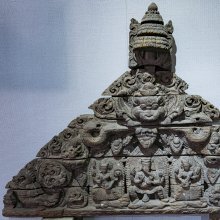Anuhara, Anuhāra: 9 definitions
Introduction:
Anuhara means something in Hinduism, Sanskrit, Jainism, Prakrit. If you want to know the exact meaning, history, etymology or English translation of this term then check out the descriptions on this page. Add your comment or reference to a book if you want to contribute to this summary article.
Images (photo gallery)
Languages of India and abroad
Sanskrit dictionary
Source: DDSA: The practical Sanskrit-English dictionaryAnuhāra (अनुहार).—Imitation, resemblance, similarity.
Derivable forms: anuhāraḥ (अनुहारः).
See also (synonyms): anuharaṇa.
Source: Cologne Digital Sanskrit Dictionaries: Shabda-Sagara Sanskrit-English DictionaryAnuhāra (अनुहार).—m.
(-raḥ) 1. Imitation. 2. Resemblance. E. anu like, hṛñ to convey, and ghañ aff.
Source: Cologne Digital Sanskrit Dictionaries: Monier-Williams Sanskrit-English Dictionary1) Anuhāra (अनुहार):—[=anu-hāra] [from anu-hṛ] m. imitation
2) [v.s. ...] resemblance.
Source: Cologne Digital Sanskrit Dictionaries: Goldstücker Sanskrit-English DictionaryAnuhāra (अनुहार):—[tatpurusha compound] m.
(-raḥ) 1) Imitation.
2) Resemblance, likeness. E. hṛ with anu, kṛt aff. ghañ.
Source: Cologne Digital Sanskrit Dictionaries: Yates Sanskrit-English DictionaryAnuhāra (अनुहार):—[anu-hāra] (raḥ) 1. m. Imitation.
[Sanskrit to German]
Sanskrit, also spelled संस्कृतम् (saṃskṛtam), is an ancient language of India commonly seen as the grandmother of the Indo-European language family (even English!). Closely allied with Prakrit and Pali, Sanskrit is more exhaustive in both grammar and terms and has the most extensive collection of literature in the world, greatly surpassing its sister-languages Greek and Latin.
Prakrit-English dictionary
Source: DDSA: Paia-sadda-mahannavo; a comprehensive Prakrit Hindi dictionaryAṇuhara (अणुहर) in the Prakrit language is related to the Sanskrit word: Anuhṛ.
Prakrit is an ancient language closely associated with both Pali and Sanskrit. Jain literature is often composed in this language or sub-dialects, such as the Agamas and their commentaries which are written in Ardhamagadhi and Maharashtri Prakrit. The earliest extant texts can be dated to as early as the 4th century BCE although core portions might be older.
Kannada-English dictionary
Source: Alar: Kannada-English corpusAnuhāra (ಅನುಹಾರ):—[noun] 'imitation i.e. a) the act of seeking to follow the example of; a taking ofsomeone or something as one''s model or pattern; b) acting the same as; a following the appearance of another; impersonation; c) (in art) reproduction in form, colour, etc.; act of making a duplicate or copy of: 2) the state, fact or quality of resembling; similarity of appearance or, sometimes, of character; likeness.'
Kannada is a Dravidian language (as opposed to the Indo-European language family) mainly spoken in the southwestern region of India.
See also (Relevant definitions)
Starts with: Anuharaka, Anuharamana, Anuharana, Anuharant, Anuharat, Anuharati.
Relevant text
No search results for Anuhara, Anu-hara, Anu-hāra, Anuhāra, Aṇuhara; (plurals include: Anuharas, haras, hāras, Anuhāras, Aṇuharas) in any book or story.
